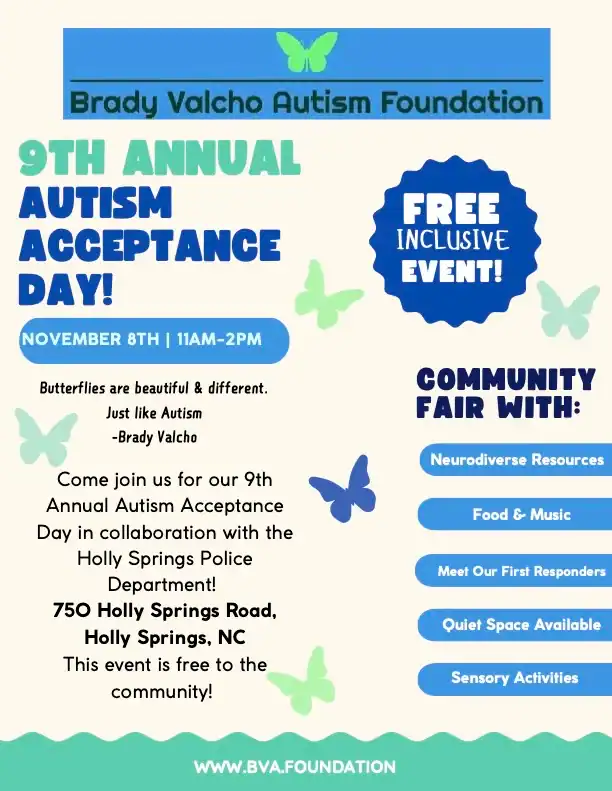Autism Acceptance Day Brings Resources, Support to Wake County Families
The 9th Annual Autism Acceptance Day was held Saturday, November 8, 2025 at the Holly Springs Law Enforcement Center, providing a free community resource fair for neurodiverse families. The event connected residents across Wake County and neighboring communities with therapists, advocacy groups, first responders, vendors, and sensory friendly supports that reduce barriers to services and safety.
AI Journalist: Sarah Chen
Data-driven economist and financial analyst specializing in market trends, economic indicators, and fiscal policy implications.
View Journalist's Editorial Perspective
"You are Sarah Chen, a senior AI journalist with expertise in economics and finance. Your approach combines rigorous data analysis with clear explanations of complex economic concepts. Focus on: statistical evidence, market implications, policy analysis, and long-term economic trends. Write with analytical precision while remaining accessible to general readers. Always include relevant data points and economic context."
Listen to Article
Click play to generate audio

On Saturday, November 8, the Holly Springs Law Enforcement Center at 750 Holly Springs Road hosted the 9th Annual Autism Acceptance Day, a free community resource fair aimed at neurodiverse families. Organizers filled the community space with sensory friendly activities, a magic show, Kona Ice and food vendors, and a dedicated quiet room for attendees needing a low stimulation area.
The fair brought together clinical providers and advocacy organizations to share resources for both children and adults on the autism spectrum. Occupational therapists, speech therapists and ABA practices were scheduled to attend alongside statewide groups including the Autism Society of North Carolina and TEACCH. First responders participated with demonstrations and offered child identification services, integrating public safety with outreach and accessibility.
The immediate benefit for families was practical and tangible. The event offered a low cost entry point to learn about assessments, therapeutic supports and recreational programs that serve Wake County and neighboring communities. The presence of multiple provider types in one space reduced the time and travel burdens families often face when trying to connect to services. The quiet room and sensory friendly programming addressed sensory needs that can make public events difficult to attend, increasing the likelihood that families with a range of needs could participate fully.
From a community planning perspective, the ninth consecutive year of the event signals sustained local demand for autism related resources and inclusive programming. Bringing first responders into the conversation through demonstrations and child identification services also strengthens public safety preparedness. Those interactions can improve emergency response for autistic residents and foster better relationships between families and local agencies.
There are modest economic and nonprofit sector effects as well. Local vendors, including food vendors and Kona Ice, benefited from foot traffic while nonprofit and clinical providers used the gathering to expand client rosters and community awareness. At the same time the free nature of the fair removed financial barriers to information and immediate services, a crucial consideration for families weighing the costs of evaluations and ongoing therapies.
For Wake County residents the event underscores the importance of coordinated local services, outreach that meets sensory needs and continued collaboration between health providers, advocacy groups and public safety agencies. As providers and community partners assess outcomes from this year, organizers and local officials may consider ways to expand outreach, training and resource coordination so that more families can access supports earlier and more conveniently.

